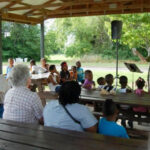Contemporary music choruses rely heavily on phrases from the Psalms: “Great is the Lord and most worthy of praise” from Psalm 96:4, “Bless the LORD, oh my soul” from Psalm 103, and the “Cornerstone” from Psalm 118:22 are all among the top 20 worship songs this month.
But recently, a spate of albums have been going one step further, and recording entire psalms.
In April 2015, singer-songwriter Sandra McCracken released an album simply titled Psalms. Back in 2001, the Texas-based group Shane & Shane dropped Psalms; its sequel, Psalms, Vol. 2, came out in 2015. The Robbie Seay Band has two LPs on the Psalms, released in 2013 and 2015. And Sons of Korah, an Australian worship group that began releasing albums in 2000, sing only psalms.
The songs on these albums attempt to capture the sense, and in some cases the words, of the entire chapter.
“It’s becoming somewhat of a trend,” said Shane Heilman, who started The Psalms Project. Heilman is also a high school principal and the president of Way Deeper Ministries, which equips people to follow the spiritual disciplines such as meditation, prayer, and fasting.
The three-volume collection by his band, The Psalms Project, has been streamed, downloaded, and purchased more than 1 million times since the first was released in 2011, Heilman said. The collection, which includes 30 psalms so far, pops up first on a Google search of “psalms” and “music.”
“Some of it is a dissatisfaction of the superficiality of modern worship lyrics,” he said. “These psalms have something to them if you’re brave enough and crazy enough to turn them into modern songs.”
Turning All 150 Psalms into Music
Heilman wants to put all 150 Psalms—in their entirety—to music.
“About 10 years ago, while I was on a mission trip, I got a compulsion to put Psalm 1 to music,” he said. He liked the tune, how the words were straight Scripture, and that it was different from the typical modern worship song.
“I got this delusional idea to try to do them all,” Heilman said. But he quit almost immediately, stumped by tangled Hebrew idioms and uneven meters.
Years later, while memorizing Psalm 2, he kept thinking, This would be such a cool song because it’s such a powerful message, a political message.
So he did it—and the next day started work on Psalm 3.
“I started to get the hang of setting weird Hebrew poems to music. Once I got through five, I thought, Why can’t I get through 150?”
Where Did the Psalms Go?
Modern worship songs often snip out phrases of praise from Psalms, leaving on the cutting floor the complaining, arguing, and uncomfortable imprecatory language, said Michael LeFebvre, pastor of Christ Church Reformed Presbyterian in Brownsburg, Indiana. Many psalms include both, sometimes switching from one extreme emotion to another.
“It takes you out of the box as a songwriter because you have to match the emotion and theology of the psalm to music,” Heilman said.
This match is often difficult, especially because he didn’t want to use the cadence of hymns but something more modern “that could be on the radio.”
“The idea that really intrigued me was: If this was the songbook of God’s people for hundreds, thousands of years, why is so little of this in our modern worship?”
Why Did They Leave?
The use of Psalms began to decline when Isaac Watts and others began writing hymns in England in the early 1700s.
“He started to write new songs because the people were tired of singing psalms,” LeFebvre said. “He was trying to make them more accessible and approachable.”
He was also trying to tweak their theology, Stephen Marini wrote in his book Sacred Song in America.
While he granted that David was unquestionably a chosen instrument of God, Watts claimed that his religious understanding could not have fully apprehended the truths later revealed through Jesus Christ. The Psalms should therefore be “renovated” as if David had been a Christian, or as Watts put it in the title of his 1719 metrical psalter, they should be “imitated in the language of the New Testament.”
Over the last 40 years, churches shifted again, this time away from hymns and toward praise choruses, Larry Eskridge wrote for Christian History. Starting with the Jesus People in the 1970s, Christians with guitars began writing their own worship songs. And while the Jesus People movement faded, the influence on corporate worship remained, sparking the now-waning “worship wars.”
Now that Christians have become used to songs that just praise God—perhaps as part of our tendency to appear at our best—songs that complain or call down God’s vengeance make us feel uncomfortable, LeFebvre said. He authored Singing the Songs of Jesus, which explains how the Psalms were originally used in worship.
“The model for worship is the king, who is a soloist, singing to God,” he said. “We’re the backup choir.”
Out of thousands of psalms sung during temple worship, the Israelites gathered these 150 in the years they spent between the Testaments, awaiting their Messiah.
“They were put together when there was no king on the throne, in expectation of the singer who is going to lead us,” LeFebvre said. “In a sense, it’s not the hymnal of the Old Testament. It’s the hymnal the Old Testament is handing to the New Testament. These hymns were given to the scattered people of God waiting for the Son of David, who is going to lead us in song again.”
Singing with Jesus the King
Jesus is that king, and we’re singing these songs with him, LeFebvre said. Though the language can be uncomfortable, we can be sure it’s right and inspired by God.
The Psalter’s occasionally dark language, while not direct praise to God, is the avenue we can use to get there, he said.
“Wrestling with our frustration, our misery, and the senselessness of the world delivers us to praise,” he said. “They are not declarations of praise, but they help us rise to praise.”
And while the specific situations—living in the tents of Kedar, engaging in physical battles, or offering burnt sacrifices—are foreign to modern Christians, they can remind us of universality of the church. These same words were sung by the ancient Israelites in the temple, by the disciples in Jerusalem, by Calvin in Geneva, and by the Puritans in New England. And today Christians in Syria, Beijing, and Nigeria are singing these same words.
“When we sing the Psalms, we are singing in solidarity with the suffering church around the world,” he said.
Not Always Easy
That said, singing the Psalms in corporate worship isn’t always easy. The language isn’t as easy as our modern-day repetition of rhyming choruses, and the emotions aren’t always so uplifting.
For those eager to teach their congregation the importance of singing psalms, LeFebvre said it helps to explain the theology of the psalms, and to teach people to look for rhyming images instead of rhyming words.
Heilman says there are numerous advantages of reclaiming the use of psalms in corporate worship—both personal and churchwide. If nothing else, the practice tethers both individual Christians and their particular local churches more closely to God’s revealed Word.
“I realized how different and specific each psalm’s message is than I originally thought. . . . They all have something so rich and unique to offer. The biggest surprise is how much is there that I didn’t see before.”
“The Most Practical and Engaging Book on Christian Living Apart from the Bible”
 “If you’re going to read just one book on Christian living and how the gospel can be applied in your life, let this be your book.”—Elisa dos Santos, Amazon reviewer.
“If you’re going to read just one book on Christian living and how the gospel can be applied in your life, let this be your book.”—Elisa dos Santos, Amazon reviewer.
In this book, seasoned church planter Jeff Vanderstelt argues that you need to become “gospel fluent”—to think about your life through the truth of the gospel and rehearse it to yourself and others.
We’re delighted to offer the Gospel Fluency: Speaking the Truths of Jesus into the Everyday Stuff of Life ebook (Crossway) to you for FREE today. Click this link to get instant access to a resource that will help you apply the gospel more confidently to every area of your life.

































